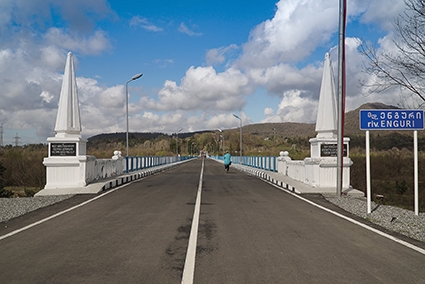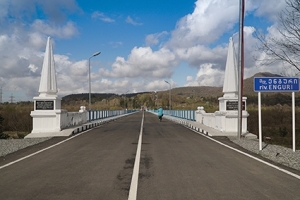Georgian Man Found Dead in Abkhaz Interrogation: Suicide?
The Abkhaz authorities say Irakli Kvaratskhelia took his own life. Georgian media is reporting on local suspicions that foul play was involved.
On Tuesday, March 12, the State Security Service of Georgia reported that a 29-year-old Georgian, Irakli Kvaratskhelia, had died in the Gali district of Georgia’s Russian-occupied Abkhazia region. The information came to the State Security Service from representatives of the de-facto Abkhaz government via the communication hotline operated by the EU Monitoring Mission.
The de-facto Abkhaz authorities say that the young man was detained on March 10 for “illegally crossing the border,” and was left alone in an interrogation room to write a confession. He was later found to have hung himself to death in the room, say reports from the de-facto Abkhaz security service. Local Georgians claim Kvaratskhelia was beaten to death after a verbal dispute with so-called border guards, who then staged his suicide.
The State Security Service immediately began an investigation to identify the circumstances of Kvaratskhelia’s death “through every instrument at its disposal,” according to an official statement.
President Salome Zurabishvili tweeted her condolences to the young man’s family, writing “The tragic news of the sad death of a young man in the occupied #Gali District is a heartbreaking continuation of the situation in our #occupiedterritories. I share the sadness of Irakli’s family and friends and pray for their strength in this difficult moment.”
Shortly after the news was released, Georgian Foreign Minister David Zalkaliani told reporters, “We received information about the alarming case yesterday from the EUMM. The reasons behind the death are being identified with the help of the Mission. Before all causes of the incident are found, we have already taken steps to inform the international community regarding the issue.” All Georgia’s diplomatic missions worldwide were instructed to inform their host countries of Kvartskhelia’s death.
At the time of his death, the young man was being held in a detention facility by de-facto Abkhaz authorities. Local residents of the Gali district told reporters that Kvaratskhelia was detained after getting into a verbal argument with occupying forces several days prior, and that he was beaten.
Georgian State Minister for Reconciliation and Civil Equality Ketevan Tsikhelashvili, told reporters that she is prioritizing confirming the details of what happened before making conclusions, saying that obtaining precise and objective information on the situation was “vitally important.”
Foreign Minister Zalkaliani confirmed that he has been in regular contact with the EU Special Representative to Georgia concerning the incident, along with the co-chairs of the Geneva International Discussions (GID) from the OSCE and UN, but he does not yet know whether Kvaratskhelia was physically abused before his death. On March 13, the GID co-chairs from the EU, UN and EU traveled to the occupied Abkhazia region to discuss the details of Kvaratskhelia’s death with de facto Abkhaz authorities.
Later that day, Kvaratskhelia’s body was transferred to his family in Tbilisi-controlled territory. Standing at the Enguri Bridge waiting to collect his remains, the Kvaratskhelia family was accompanied by a retinue of Georgian government officials including Deputy State Minister for Reconciliation and Civic Equality Ruslan Abashidze and officials from the State Security Service.
On the morning of Thursday, March 14, an autopsy was conducted to determine the cause of death. The exam lasted approximately five hours, after which the following statement was released by medical examiner Irakli Toidze:
“Pieces of rope were found inside the wounds [on the throat]. No other damage has been found. As for the damage on the throat, laboratory studies will determine whether it was inflicted when the man was alive or whether they appeared after death.”
There is currently no explanation as to where Kvaratskhelia might have gotten the rope, how long he was left alone in the interrogation room, or why there was no surveillance in the room.
The Georgian autopsy report is in line with a medical examination conducted by the de-facto Abkhaz authorities before his body was transferred, who found “no traces of violence” on the body.
Minister Tsikhelashvili believes there are no witness who could tell the story of what really happened to Kvaratskhelia. More information is expected to surface in the coming days.
By Samantha Guthrie
Image source: JAM News












